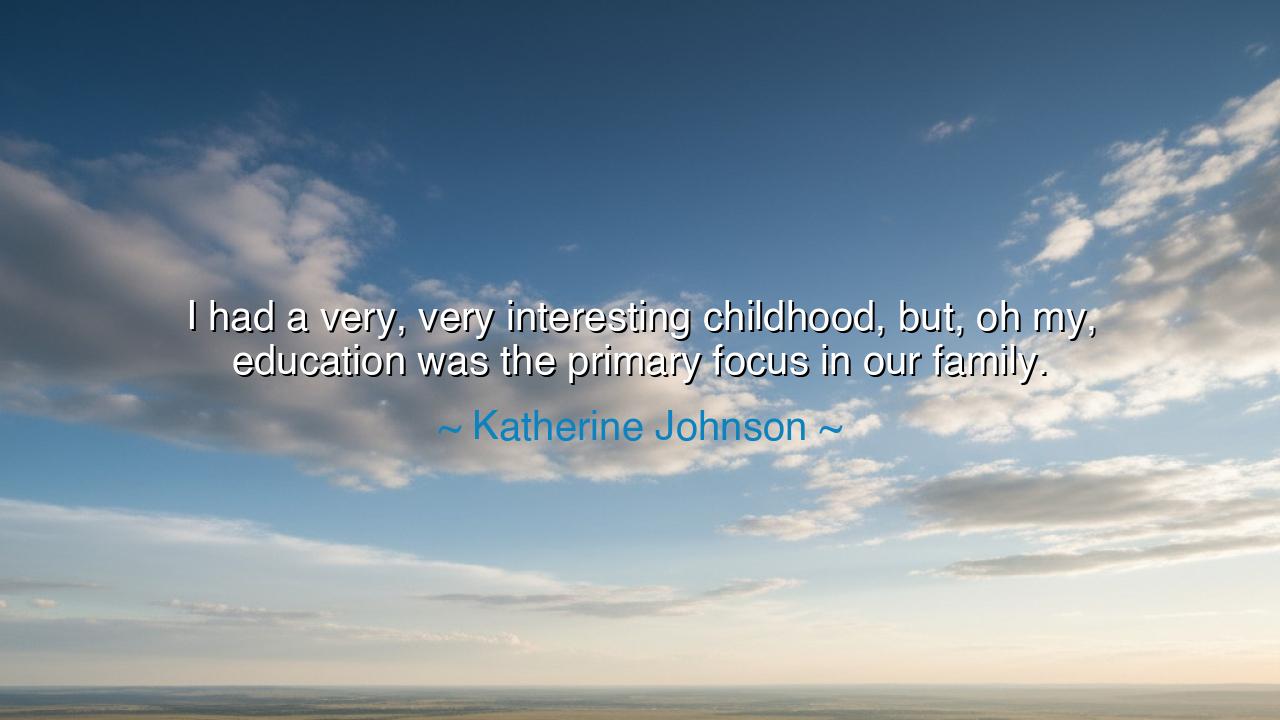
I had a very, very interesting childhood, but, oh my, education
I had a very, very interesting childhood, but, oh my, education was the primary focus in our family.






Host: The soft hum of the evening fills the room, the last rays of sunlight filtering through the window as the world outside begins to darken. Inside, the warmth of the room contrasts with the cool evening air, creating a sense of peace. Jeeny sits by the window, her fingers lightly tapping on the armrest of the chair, lost in thought. Jack stands near the bookshelf, idly flipping through a few pages of a book. The stillness of the room feels like a moment suspended in time.
Jeeny: “Jack, I came across a quote from Katherine Johnson today,” she says, her voice breaking the silence. “She said, ‘I had a very, very interesting childhood, but, oh my, education was the primary focus in our family.’ What do you think about that?”
Jack: He turns, his expression thoughtful, as if considering her words. “Education was the primary focus in her family, huh? That’s interesting. I guess that’s what a lot of families say, but it’s not always the case. It makes you wonder, though, what kind of childhood she had if education was the central theme. It almost feels like it shaped her whole life.”
Jeeny: “I think it did, Jack. The way she talks about it, there’s this sense of discipline and priorities in her upbringing. Education wasn’t just an afterthought for her family; it was everything. And when she says her childhood was ‘interesting,’ I think she means that it was full of curiosity, learning, and experiences that were centered around growth. For her, that probably shaped everything she did later in life.”
Host: The room feels quieter now, as though the conversation has touched something deeper. The way Jeeny speaks about Katherine Johnson’s childhood — a mix of discipline and a commitment to learning — resonates in the stillness of the moment. Jack watches her, his expression softening, as if the idea of education being a foundation for everything she did is starting to make sense.
Jack: “So you think she saw her childhood as shaped by education, even more than by the usual family experiences we associate with growing up, like playtime or bonding moments?”
Jeeny: “Yes, exactly. For Katherine Johnson, her family’s emphasis on education wasn’t just about getting good grades or studying hard. It was about instilling a sense of curiosity, of always questioning, always learning. And I think that’s why she became so groundbreaking in her field. Her foundation wasn’t just about what she was taught in school, but about how her family nurtured a love of learning, a curiosity about the world.”
Host: The quiet in the room grows deeper, as if both of them are considering the idea of a childhood that is not defined by the usual markers, but instead by the constant push for intellectual growth. The idea of education as a foundation for everything else seems to linger between them, like a thought that resonates long after it’s been spoken.
Jack: “I guess when you’re raised to see education as the key to everything, it makes sense that it would be the one thing that drives you. It’s more than just a way to get by; it’s the way you see the world. But it also seems like a lot of pressure, doesn’t it? To have that kind of focus so early on.”
Jeeny: “It could be. But maybe it’s also what gave her the clarity to push through the obstacles she faced. If education was at the core of her family’s values, then failure and setbacks weren’t as much about giving up — they were about learning how to improve. For someone like Katherine Johnson, education wasn’t just a means to an end; it was the lens through which she saw everything, including her own growth and potential.”
Host: The light from the window has faded now, the room growing a little darker as the evening continues. The soft hum of the world outside continues to fade, but inside, the weight of their conversation about Katherine Johnson’s childhood and the role of education feels like a moment suspended in time, a reflection on how deeply our upbringing can shape who we become.
Jack: “It’s interesting to think about how we shape our own lives, you know? What if we all treated learning the way her family did — as the primary focus, the foundation for everything? Maybe that’s what leads to greatness.”
Jeeny: “Maybe. It’s about purpose, and about understanding that learning is never just about the classroom. It’s about the desire to understand, to improve, and to grow — and when that’s instilled in you from an early age, it can lead to incredible things.”
Host: The room feels quieter now, but there’s a warmth between Jeeny and Jack, as if their conversation about education as a guiding force in life has sparked a new reflection in them both. In this quiet, the idea of learning — not just as a pursuit of knowledge, but as a foundation for growth — feels like a profound truth that carries far beyond the walls of a classroom, into the very essence of who we are and who we can become.






AAdministratorAdministrator
Welcome, honored guests. Please leave a comment, we will respond soon